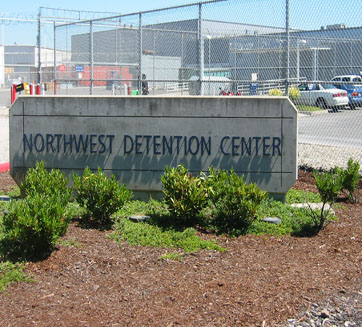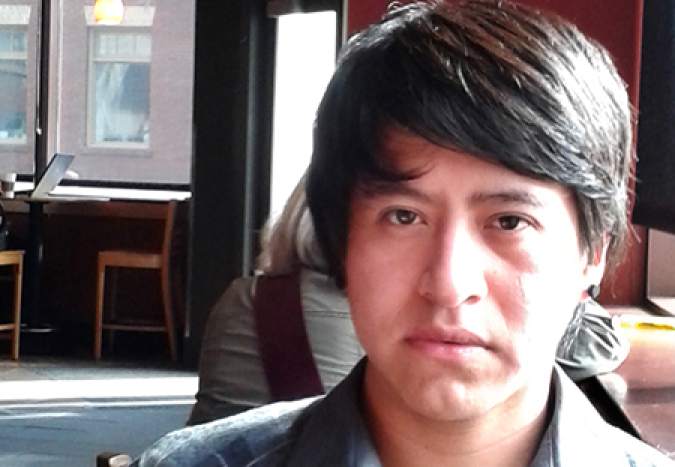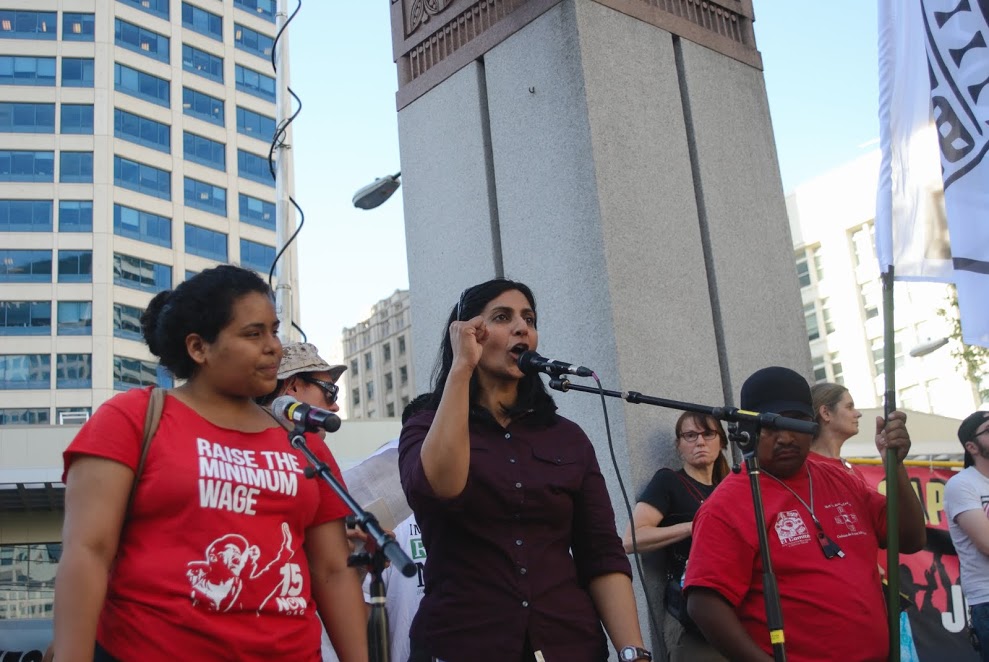**SEE UPDATE BELOW***
The American Civil Liberties Union joined Seattle rights organization Columbia Legal Services Thursday in filing a lawsuit to stop solitary confinement for hunger strikers at Tacoma’s Northwest Detention Center.
The groups argue that US Immigration and Customs Enforcement (ICE) is using illegally using isolation cells – widely known as “the hole” – as punishment for detainees engaging in peaceful protests. The group is asking a federal judge to force ICE to stop the practice by issuing a restraining order.
“Retaliating against and punishing immigrant detainees engaged in peaceful protests is an unlawful attempt to chill free speech,” Sarah Dunne, the ACLU’s Washington legal director, says in a release distributed to the press. “They have free speech rights protected by the Bill of Rights.”
Following on anti-deportation demonstrations outside the facility last month, protesters inside began hunger strikes in early March, complaining of inadequate food while calling for more family contact, lower prices at the facility’s commissary, and better pay for detainees who work in the facility, according to activists and a former hunger striker interviewed by Seattle Weekly.
Andrew Munoz, spokesperson for ICE, declined to comment on the lawsuit, citing its active status.
Even as news of the lawsuit broke, the extent of the protests remains in dispute. Seattle lawyer and University of Washington professor Angelica Chazaro, who has coordinated with protesters in the facility, says that in contacts last weekend, at least 140 detainees remained on hunger strike, of whom 40 had been sent to solitary confinement.
“The protest is not over,” Chazaro says.
According to a statement detailing the ongoing Northwest Detention Center protests issued by activists Thursday, 25-year-old Jesus Gaspar Navarro “ended his 25-day hunger strike Tuesday morning with a full breakfast,” and “an hour later, after speaking on air on Spanish language 1360 am about the strike … was removed from medical isolation to solitary confinement.” The statement also indicates that Ramon Mendoza Pascual, “who was held in medical isolation for two weeks,” had a hearing on charges stemming from the fast and was convicted of inciting a group demonstration. The statement indicates that Pascual “was sentenced to 20 days in solitary confinement,” including conditions “near total deprivation” – describing a “23 hour a day lockdown with no human contact (one hour a day of solitary time in the prison yard), no use of telephone, no access to commissary account items, and no access to television or written materials.” According to the release Navarro and Pascual “joined dozens of other hunger strikers who are in isolation in retaliation for the hunger strike.”
Munoz, however, disputes the number of detainees on strike.
“According to our detention standards,” Munoz told Seattle Weekly Thursday, “[detainees] must be observed going without food for 72 hours.” By those standards, he tells Seattle Weekly one person is currently on strike. On Tuesday Munoz confirmed to Seattle Weekly’s Nina Shapiro that officials separated “several” detainees from the general population, claiming that the action “came after the agency received multiple complaints from detainees and immigration attorneys that some individuals were intimidating other detainees into participating in protests.”
The difference in accounts regarding the extent of the protests has been an ongoing theme since the beginning. At the start of the event in early March, activists said that all but 100 of the facility’s 1,300 detainees were participating in the protest. ICE, meanwhile, claimed only 750 meal trays had been returned uneaten on the first day of the strike.
The first hearing on the suit will be Friday morning at 9:30 a.m. at US District Court in Tacoma.
UPDATE: The ACLU of Washington announced Friday it is withdrawing its motion for a restraining order following the release of some of the hunger strikers from solitary confinement, even as others remained locked down. Even though some hunger strikers remain in isolation, according to ACLU spokesman Doug Honig, at issue is whether these detainees were placed there as punishment for the protest or for other reasons.
Sandy Restrepo, head of the People’s Legal Collective and an attorney for some of the strikers, said activists were working to determine the number of hunger strikers remaining in solitary.
The ACLU of Washington said via a press release this morning that all hunger strikers at the Northwest Detention Center have been released from solitary confinement.
Here’s the full release:
Federal immigration authorities have released hunger strikers from solitary confinement at the Northwest Detention Center in Tacoma, Washington. The action came after the ACLU of Washington (ACLU-WA) and Columbia Legal Services (CLS) filed a lawsuit seeking a court order to prohibit U.S. Immigration and Enforcement (ICE) from retaliating against detainees who engage in First Amendment-protected activities by placing them in solitary confinement.
“Our clients are very grateful to be out of solitary confinement after 6 days in it. This is a victory for free speech and fair treatment,” said Melissa Lee, Attorney and Institutions Project Coordinator with CLS.
“We’re very pleased that ICE has stopped retaliating against detainees engaged in peaceful protest. Punishing hunger strikers by putting them in isolation cells was an unlawful attempt to chill free speech rights” said ACLU-WA Legal Director Sarah Dunne.
Several hundred detainees at the Northwest Detention Center (NWDC) in Tacoma initiated a hunger strike on March 7, 2014 to express concerns with national immigration policy and to raise awareness about the conditions of their confinement. On March 24 some detainees initiated a new hunger strike. Beginning on March 27, ICE began placing individuals in solitary confinement in retaliation for their support of the hunger strikes. These individuals were put in solitary confinement where they were kept in cells for 23 hours a day and were deprived of meaningful interactions with others.
The Plaintiffs represented by ACLU-WA and CLS were placed in solitary confinement after corrections officers entered their living area and invited approximately 20 detainees to meet with an assistant warden to discuss their reasons for engaging in a hunger strike. The Plaintiffs and other detainees who volunteered to attend the meeting were immediately placed in handcuffs and taken to individual isolation cells. Plaintiffs were not told why they were placed in solitary confinement nor how long they would have to live in isolation.
Handling the case are ACLU-WA staff attorneys Sarah Dunne, La Rond Baker and Margaret Chen; Columbia Legal Services staff attorneys Melissa Lee, Nick Straley, and Andrea Schmitt; and ACLU-WA cooperating attorney Sal Mungia of the firm Gordon Thomas Honeywell, LLP.








